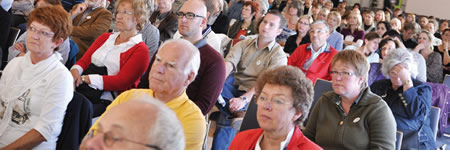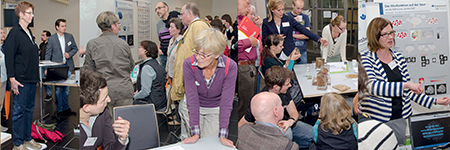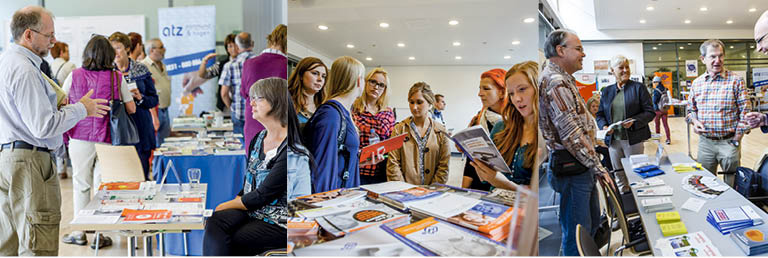BRAIN DAY 2014 – Programme

FROM FUNDAMENTAL RESEARCH TO THERAPY
A day with a focus on Bochum’s neuroscience with lectures, information stands and activities.
10.09.2014, 12-17, RUB Conference Center
PROGRAMME
| 13:00 | BEGIN OF THE SUPPORTING PROGRAM Presentations of support groups Activities to join in |
| 13:30 | WELCOME AND OPENING Prof. Dr. Denise Manahan-Vaughan, Speaker of Collaborative Research Centre 874, Ruhr-University Bochum |
| 13:45 | ALZHEIMER’S DISEASE: NOT JUST A QUESTION OF FATE Prof. Dr. Denise Manahan-Vaughan, Speaker of Collaborative Research Centre 874, Department of Neurophysiology, Medical Faculty, Ruhr-University Bochum |
| Read more In the press we have been reading of a “groundbreaking breakthrough” capable of healing Alzheimer’s disease. Despite this, the disease is currently incurable. This kind of sensationalist journalism not only builds up unrealistic hopes for patients and their families, but also fuels the opinion that Alzheimer’s research is not progressing fast enough. But, in the last 20 years neuroscientists have made extremely important advances in the characterization of fundamental mechanisms of Alzheimer’s. In my talk I will begin by explaining which molecular and cellular modifications lead to loss of memory and dementia associated with Alzheimer’s. Then I will report on the newest findings concerning risk factors connected with the disease. Finally I will pose the question “If you knew that your “lifestyle” increases the risk of Alzheimer’s, would you change it?” | |
| 14:15 | LOOKING FOR THE ENGRAM: HOW THE BRAIN STORES MEMORIES PD Dr. med. Nikolai Axmacher, Clinic for Epilepsy, University of Bonn |
| Read more The ability to remember experiences and learn new skills is fundamental to our existence; without memory, events would pass us by without leaving a trace. For a long time we have been investigating which psychological processes and neural mechanisms contribute to different kinds of memories, and how they are impaired in various neurological and psychiatric illnesses. Despite much progress, for a long time we have not been able to trace the path of our memories – the engram. In my lecture I will present currents research projects that aim to find the engram and show you some of their impressive results. These studies also look at the role of sleep and dreams in the forming of memories. This fascinating field of research could one day enable us to look at brain activity and predict what we are currently remembering, and it could help us understand which processes lead to the deformation of memories in neurological and psychiatric diseases. | |
| 14:45 | COFFEE BREAK + SUPPORTING PROGRAMME |
| 16:00 | Morbus Huntington – AN EXAMPLE OF A HEREDITARY NEUROLOGICAL DISEASE Prof. Dr. med. Carsten Saft Chair of the Clinical Part of the Huntington-Center North Rhine-Westphalia at St. Josef-Hospital Bochum |
| Read more Huntington’s disease is an autosomal dominant hereditary neurodegenerative disease. In most cases the first complaints begin in middle to older age with progressing impairment in the motor skills as well as cognitive and psychiatric symptoms. Ultimately, even children can be afflicted with this disease. “Chorea” is the most typical and common movement disorder. It is an involuntary, sudden, quick, irregular, and unforeseeable movement of the extremities, the face, the neck or the upper body. Preceding this, family members and friends often notice changes in the personality of the person concerned. In 1979, for the first time, a group of scientists from the international “Venezuela Collaborative Research Project” traveled to Lake Maracaibo in Venezuela, a region with a very high number of Huntington’s patients. A significant contributor to this work was and is Nancy Wexler. Her mother was afflicted with M. Huntington, so that she herself has a 50% risk of contracting the disease. In 1983 the Huntington gene was located and since 1993 exact molecular genetic diagnostic is possible. Based on these findings, our understanding of the disease has increased significantly over the last 20 years. In the laboratory there are first advances towards a possible treatment. The research community hopes to be able to test the effectiveness of their findings on patients in the next few years. The Bochum Huntington Center North Rhine-Westphalia, a cooperation between the Clinic of St. Joseph Hospital (Clinic Director: Prof. Dr. med. Ralf Gold) and the Department of Human Genetics of the Ruhr-University Bochum (Chair: Prof. Dr. Jörg T. Epplen) has made a worldwide name for itself, clinically as well as scientifically. | |
| 16:30 | STUTTERING IN THE BRAIN: NEURAL CORRELATES OF STUTTERING Prof. Dr. med. Katrin Neumann, Senior Physician in the Department of Phoniatrics and Pediatric Audiology, St. Elisabeth-Hospital Bochum |
| Read more Since the 1990s findings in neuroscience and human genetics have revolutionized our understanding of stuttering. The largest part of the many causes of stuttering is hereditary, as behavioral and molecular genetics, twin research, and genealogy analysis have shown. Stutterers have, probably hereditary, abnormalities in the areas of their brains responsible for hearing and speaking; this impairs their flow of speech. The brain tries to help itself with a number of compensatory mechanisms, some more successful than others. These are the topic of my lecture. Furthermore I look at how a successful stuttering therapy influences the brain and at the effects of individual therapy components, such as slow, rhythmic speaking, the use of melodic speech, and speaking free of fear. Finally, I will highlight how brains of people function, which have spontaneously stopped stuttering, and how this is significant to therapy. Briefly we will also talk about the effectiveness of various stuttering therapies investigated in Germany and worldwide. |
SUPPORTING PROGRAMME

Brain Spots
Bochum’s neuroscientists present themselves and share the results of their research. Cutting-edge technologies and current questions of society contribute to brain research. The Neural Plasticity Lab illustrates this with chosen examples and hands-on demonstrations, i.e.:
• What is “augmented reality”? And how do scientists use a pair of glasses to give the wearer additional information to reality?
• First-person-shooter video games are not only of interest to children and their parents, but to Bochum’s scientists!
• From fundamental research to application: a stimulatory glove for stroke patients improves motor-sensory performance.
Would you like to learn about the connection between eye movement and stress? Then you should take a look at the “Eye-Tracking-System” presented by the Cognitive Psychology.
Or, did you always want to know how pictures of the brain are created using magnetic resonance imaging (MRI)? An MRI-scan visualizes the structure of our brain. But how do MRI-measurements work? And how is the image created and its three-dimensional information? With the help of functional magnetic resonance imaging (fMRI) the “working” brain is made visible. But how? Staff of the neurological clinic at Bergmannsheil will amaze you.
INFORMATION STANDS OF THE SUPPORT GROUPS

Alzheimer Gesellschaft Bochum e.V. Demenz-Servicezentrum Region Ruhr
Autismus-Therapie-Zentrum Dortmund und Hagen
Bundesvereinigung Stottern & Selbsthilfe e.V.
Clusterkopfschmerz-Selbsthilfe-Gruppe Recklinghausen
Deutsche Huntington-Hilfe e.V.
Deutsche Multiple Sklerose Gesellschaft
Deutsche Myasthenie Gesellschaft e.V. Regionalgruppe Bochum/Dortmund
Epilepsie-Selbsthilfegruppe Essen
Restless Legs Selbsthilfegruppe Bochum
Schlaganfall Landesverband NRW e.V.
REGISTRATION
Participation is free of charge
Please confirm your attendance via
Sfb874-pr@rub.de
Or Phone: 0234 32-26675
DIRECTION
Public Transport: subway U35 exit „Ruhr-Universität Bochum“, enter through Mensa (university cafeteria)
Car: via Universitätsstraße, Parking Deck P9, then follow signposts
Download Map Directions here.
